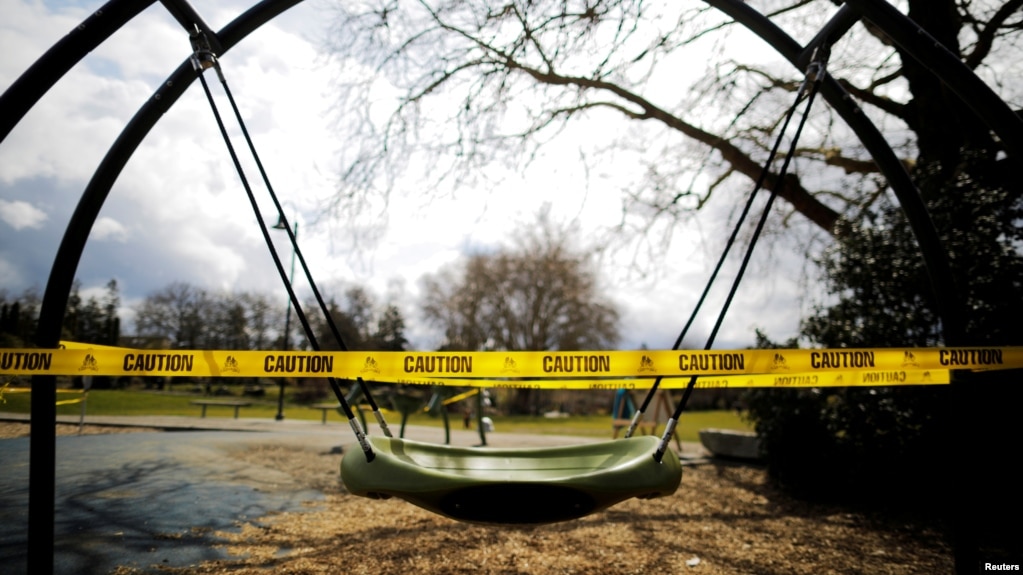
Legal experts say government restrictions aimed at halting the spread of the new coronavirus have raised questions about whether the measures could be violating Americans’ civil rights.
Restrictions by state governments across the country have included orders for citizens to stay home and not to gather in groups. Many businesses and stores have also been ordered to close. As a result of the closings, many people cannot work and will not be paid.
Some Americans have protested the orders because they say some of the restrictions violate civil rights protections.
In New Hampshire, a member of a church brought a legal challenge to the restriction on large gatherings, saying it violates her religious rights. In Pennsylvania, the owner of a golf course brought a case arguing that the state’s order to close his business amounts to an illegal seizure of private property.
Legal experts say such protests are likely to increase if the restrictions become stronger, are extended for longer periods and are backed by enforcement measures.
Larry Gostin is a public health lawyer at Georgetown University. He told the Associated Press that so far the orders have not included, what he calls, “draconian methods.” He said those methods would include armed police blocking people’s movement in the streets. It could also involve government monitoring of citizens’ movements or telephone calls.
“But we are seeing lockdowns of millions of citizens like we have never seen before,” Gostin said. He added that America could be at the beginning “of something that could transform American values and freedoms.”
Thousands of Americans are already under orders to remain in their homes under threat of fines - or possibly jail – and businesses are losing money.
In the southern state of Kentucky, one man infected with the coronavirus recently left a hospital and refused to quarantine himself. Officials send an armed local officer to watch the man’s home to make sure he did not leave.
Kentucky Governor Andy Beshear defended the action to reporters. “It’s a step I hoped I’d never have to take, but we can’t allow one person who we know has the virus to refuse to protect their neighbors.”
Under the U.S. Constitution, the power to order shutdowns and quarantines belongs almost entirely to U.S. states.
American courts have ruled over the years that the federal government itself cannot order nationwide quarantines or business closures. The U.S. government does, however, have constitutional powers to quarantine international travelers or those traveling state to state who are suspected of carrying an infectious disease.
Some legal scholars say if U.S. President Donald Trump did seek to order a nationwide lockdown, he would likely need to get the leaders of all 50 states to agree to the exact same restrictions.
But such a move does not seem likely. Trump recently said he hopes restrictions can be lifted to help the struggling U.S. economy by as early as Easter Sunday, April 12. Some state officials have warned against lifting the restrictions too soon.
New York Governor Andrew Cuomo has said he thinks the federal government is responsible for giving guidelines that states can then use to create their own policies. “What works for New York isn’t necessarily going to work for Tulsa or San Antonio." Cuomo added: “The federal government isn’t saying we mandate anything.”
The laws guiding states in what steps they can take can be complex and difficult for judges to follow. Some of the laws are very old and may need to be changed, a report by the Congressional Research Service found.
The laws also differ from state to state. The most severe penalty in most states for someone who violates a quarantine order - which is often backed by a court order - is no more than a year in jail. In Mississippi, it can be 10 years in some cases, says the National Conference of State Legislatures.
So far, only a few Americans have brought legal challenges to the government’s coronavirus restrictions. But legal experts say this small number could grow into a flood if lockdowns continue for weeks or months.
Words in This Story
church – n. a building where Christians or other people gather for religious services.
challenge – n. an expression of disagreement with ideas, rules or someone’s authority
draconian – adj. very severe
monitor – v. watch carefully and record the results
transform – v. to completely change something
quarantine – n. keeping someone apart from others so they do not pass on a disease
allow – v. to permit
mandate – v. to officially require something